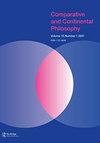Towards a Transcendental Philosophy of Spatiality: Husserl, Paliard, and Deleuze on Non-Extensional Spaces
IF 0.3
0 PHILOSOPHY
引用次数: 1
Abstract
ABSTRACT This essay will explore the constitution of a transcendental theory of space through an examination of the notion of spatial synthesis in the works of Husserl, Paliard, and Deleuze. First, we shall explore the constitution of the sensorial fields in Husserl’s phenomenology. In Husserlian terms, space is not originally an empty form that can eventually be filled with a certain empirical content. Accordingly, the philosopher claims that spatiality is a consequence of the immanent synthesis of sensations. Then, we will move on to Jacques Paliard’s psychology of perception, where we will find both aesthetic and noetic synthesis as transcendental conditions for the perception of space. Lastly, we will explore Deleuze’s theory of intensive space, specifically the concept of depth developed in a dialogue with Paliard. This comparative analysis shows that purely intensive fields of individuation are a transcendental a priori for the perception of an extensive space.走向超验的空间哲学:胡塞尔、帕利亚德和德勒兹关于非扩展空间
本文将通过对胡塞尔、帕利亚和德勒兹作品中空间综合概念的考察,探讨先验空间理论的构成。首先,我们将探讨胡塞尔现象学中感觉领域的构成。用胡塞尔的术语来说,空间最初并不是一种最终可以被某种经验内容填满的空的形式。因此,哲学家声称空间性是感觉的内在综合的结果。然后,我们将转向雅克·帕利亚的感知心理学,在那里我们将发现美学和思维的综合都是空间感知的先验条件。最后,我们将探讨德勒兹的密集空间理论,特别是在与帕利亚的对话中发展起来的深度概念。这种比较分析表明,纯粹密集的个性化领域是对广阔空间感知的先验先验。
本文章由计算机程序翻译,如有差异,请以英文原文为准。
求助全文
约1分钟内获得全文
求助全文

 求助内容:
求助内容: 应助结果提醒方式:
应助结果提醒方式:


